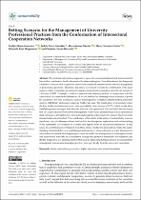| dc.description.abstract | he professional practices represent a space for interorganizational and intersectoral alliances that contribute to the development of localities and regions. From this referent, the design and validation of intersectoral cooperation networks is considered pertinent for the effective management of professional practices. Therefore, this article is oriented towards the construction of the ideal scenario where a universitygovernmentcompany intersectoral cooperation network can operate on a horizon of 2030. Foresight is used as a research and planning method, in conjunction with the consultation of experts from different social sectors that lead to obtaining sixteen scenarios of probable occurrence. For this, techniques, such as the prospective workshop, Delphi method, structural analysis (MICMAC) and scenario analysis (SMIC), are used. The results show a bet scenario where the four finally selected events occur, with a probability of occurrence of 35.7%, which would allow establishing future strategies that allow the network to be operational. It is concluded that the formation of a cooperation network for the management of university professional practices represents in itself a strategy to strengthen the curriculum and guide the achievement of common objectives in the intersectoral context studied. The contribution of the article to the study of sustainability sciences stands out, since it addresses a theme that leads to the description, explanation and understanding of the sustainable development of localities and regions from an educational dimension. In this sense, the contribution is synthesized from three planes of reflection and analysis: firstly, the understanding of sustainability as a multidimensional construct, where education is a key dimension to consolidate sustainable development processes; secondly, the management of interorganizational and intersectoral networks as a cooperation strategy that promotes sustainable development; and thirdly, prospective as a planning method that leads to delineating betting scenarios for sustainability management from an educational perspective, more specifically from the university curriculum. | es_PE |


